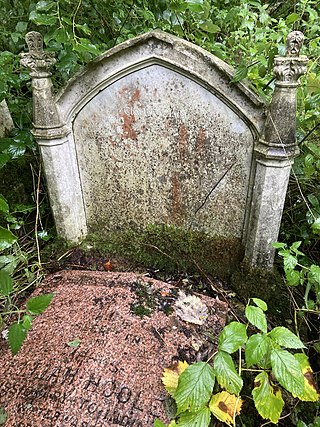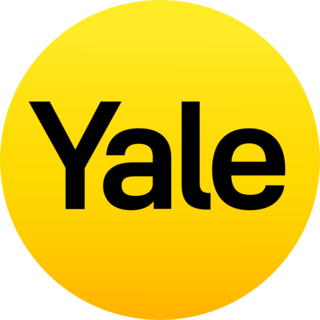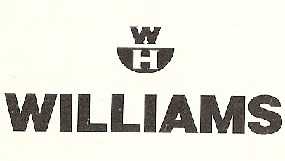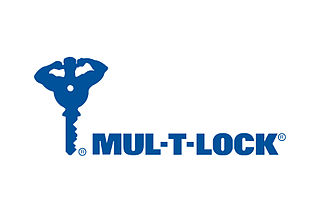
Locksmithing is the work of making and defeating locks. Locksmithing is a traditional trade and in many countries requires completion of an apprenticeship. The level of formal education legally required varies from country to country from none at all, to a simple training certificate awarded by an employer, to a full diploma from an engineering college, in addition to time spent working as an apprentice.

Linus Yale Jr. was an American businessman, inventor, mechanical engineer, and metalsmith. He was a co-founder with millionaire Henry R. Towne of the Yale Lock Company, which became the premier manufacturer of locks in the United States. He was the country's leading expert on bank locks and its most important maker. By the early 20th century, about three-quarter of all banks in America used his bank locks. He is best remembered for his inventions of locks, especially the cylinder lock, and his basic lock design is still widely distributed today, and constitutes a majority of personal locks and safes.
Assa Abloy AB is a Swedish Group whose offerings include products and services related to locks, doors, gates, and entrance automation. Related products and services include controlling access and confirming identities with keys, cards, tags, mobile, and biometric identity verification systems.

A lock is a mechanical or electronic fastening device that is released by a physical object, by supplying secret information, by a combination thereof, or it may only be able to be opened from one side, such as a door chain.

A safe is a secure lockable enclosure used for securing valuable objects against theft or fire. A safe is usually a hollow cuboid or cylinder, with one face being removable or hinged to form a door. The body and door may be cast from metal or formed out of plastic through blow molding. Bank teller safes typically are secured to the counter, have a slit opening for dropping valuables into the safe without opening it, and a time-delay combination lock to foil thieves. One significant distinction between types of safes is whether the safe is secured to a wall or structure or if it can be moved around.

A Chubb detector lock is a lever tumbler lock with an integral security feature, a re-locking device, which frustrates unauthorised access attempts and indicates to the lock's owner that it has been interfered with. When someone tries to pick the lock or to open it using the wrong key, the lock is designed to jam in a locked state until either a special regulator key or the original key is inserted and turned in a different direction. This alerts the owner to the fact that the lock has been tampered with.

UTC Climate, Controls & Security was a global provider of building technologies offering fire safety, security, building automation, heating, ventilating, air-conditioning, and refrigeration systems and services. A wholly owned subsidiary of United Technologies Corporation, UTC Climate, Controls & Security was a $16.7 billion company with 55,000 employees serving customers in more than 180 countries.

A glass break detector is a sensor that detects if a pane of glass has been shattered or broken. These sensors are commonly used near glass doors or glass storefront windows. They are widely used in electronic burglar-alarm systems.
Ardeshir Burjorji Sorabji Godrej (1868–1936) was an Indian businessman. With his brother Pirojsha Burjorji, he co-founded the Godrej Brothers Company, the precursor of the modern Godrej Group.

Chubb Fire & Security is a British multinational company that provides property protection and life safety equipment and services, including fire protection and security systems. It has been a subsidiary of APi Group Corporation since January 2022.
Tor Sørnes was a Norwegian author, politician, engineer and the designer and inventor of the VingCard, the first recodable keycard lock and the magnetic stripe keycard lock.

Kwikset is an American lock and lockset manufacturer owned by Assa Abloy. Originally Gateway Manufacturing Company, Kwikset was founded in California in 1946 by Adolf Schoepe, and Karl Rhinehart.

An interchangeable core or IC is an adaptable locking key cylinder, which can be rapidly exchanged in the field via the use of specialized "control keys".

Charles Chubb was an English lock and safe manufacturer.

A magnetic keyed lock or magnetic-coded lock is a locking mechanism whereby the key utilizes magnets as part of the locking and unlocking mechanism. Magnetic-coded locks encompass knob locks, cylinder locks, lever locks, and deadbolt locks as well as applications in other security devices.

Yale is a lock manufacturer and a subsidiary of Assa Abloy, except in the United States and Canada where the brand has been owned by Fortune Brands Innovations since 2023. The global company is headquartered in Stockholm, Sweden. Its initial product was the Yale lock, invented by Linus Yale Sr., and it became the foundation of the enterprise founded by Linus Yale Jr. and Henry R. Towne.

Williams Holdings was a major British conglomerate. It was listed on the London Stock Exchange, and was a constituent of the FTSE 100 Index.

Mul-T-Lock is an Israeli company that develops and sells padlocks, combination locks, and related security products. It was founded in 1973 by Moshe Dolev and Avraham Bahry and is a subsidiary of Assa Abloy. Four years later, in 1977, Mul-T-Lock introduced the telescopic pin technology and entered the cylinders market.
Chubbsafes is a brand of safes and vaults with its origins in the UK. It specialises in products which offer certified burglary protection and/or fire protection.

VingCard Elsafe, whose origin was in Moss, Norway, is an international producer of hotel locking systems, electronic in-room safes and energy management systems. After inventing the first mechanical hole card operated lock in 1976, VingCard was acquired in 1994 by ASSA ABLOY, and merged with the electronic safe producer Elsafe to form VingCard Elsafe in 2006. Since 2015 VingCard Elsafe is not an operating company, but a product brand within ASSA ABLOY Global Solutions. In 2024, Vingcard is re-launched.
















